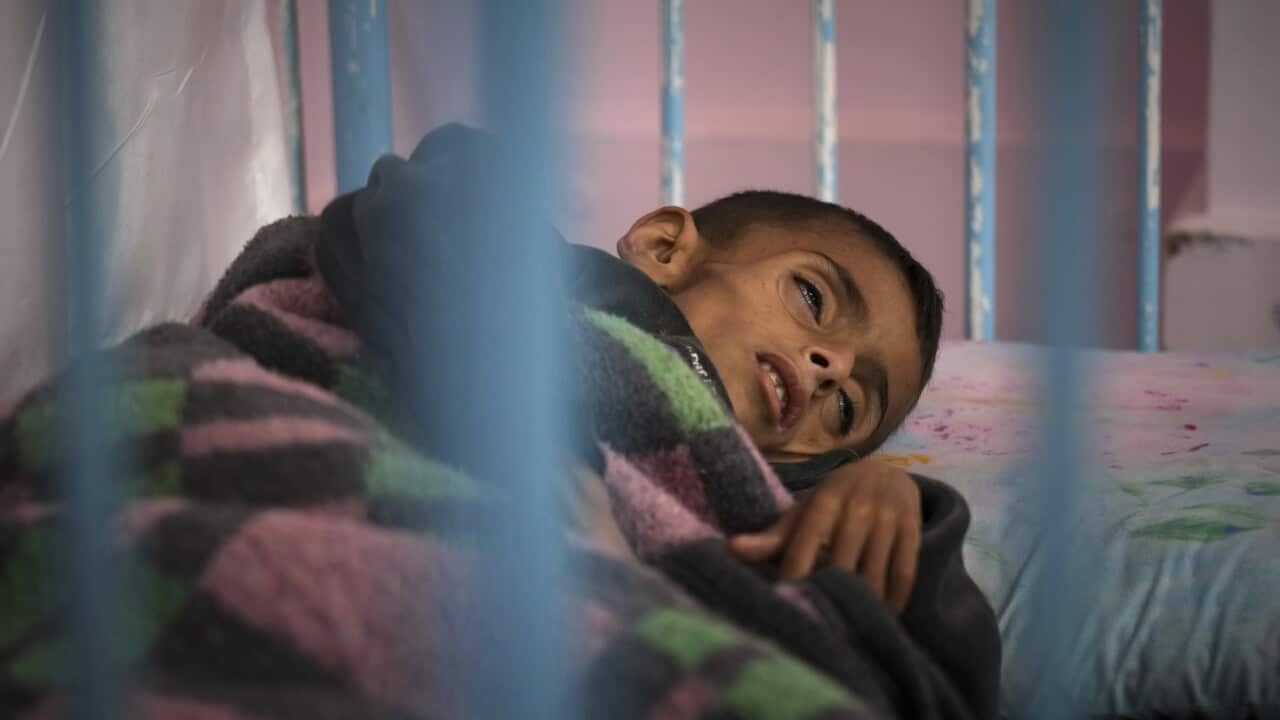Key Points
- The UK and France have condemned Israel's latest offensive on Gaza.
- The UK's foreign minister has summoned the Israeli ambassador to hear British demands on Gaza.
- Australia signed a joint statement this week calling for Israel to allow aid to enter Gaza.
Israel has had its trade negotiations with the United Kingdom suspended, amid mounting pressure from international allies to cease its escalating attacks on Gaza and allow more aid into the besieged enclave.
This week, UK political leaders made their strongest criticisms of Israel since the October 7 attacks, with foreign secretary David Lammy calling Israel's incursion into Gaza "morally unjustifiable, wholly disproportionate and utterly counterproductive".
A day after Israel said it would lift the aid blockade it's imposed since March, the United Nations said 14,000 babies were still at risk of dying in the next 48 hours.
The UN said that, while trucks had started entering Gaza, no aid had been delivered yet, partly due to logistical hurdles imposed by Israeli authorities, who want to prevent Palestinian militants from diverting and seizing aid supplies.
Palestinian health officials have said hundreds had been killed in attacks in the past week, including 50 on Tuesday and 130 on Sunday night.
On Wednesday, Foreign Minister Penny Wong said Australia had joined "international partners in calling on Israel to allow a full and immediate resumption of aid to Gaza".
"Horrifying UN reports overnight about the further risks to babies and children in Gaza underline our call. The Israeli Government cannot allow the suffering to continue."
Wong said Australia also condemned the "abhorrent and outrageous comments made by members of the Netanyahu government" about the Gaza crisis.
While Wong didn't name any Israeli politicians, the country's finance minister, Bezalel Smotrich has recently said Israel planned to "conquer, cleanse and stay — until Hamas is destroyed," adding that: "Along the way, what remains of the strip is also being wiped out."
Earlier in May, Smotrich said: "We are finally going to occupy the Gaza Strip. We will stop being afraid of the word 'occupation'".
"We are separating Hamas from the population, cleansing the strip, returning the hostages, and defeating Hamas," he said, according to The Times of Israel.
On Monday, Australia signed a separate joint statement calling for the resumption of aid to Gaza and an unimpeded passage for aid workers, but didn't go as far as threatening to place sanctions on Israel.
Also this week, the European Union said it would review its trade agreements with Israel, while the UK, France, and Canada threatened Israel with immediate sanctions if it didn't change course.
Experts say recent developments are "significant" but are unlikely to have an immediate deterrent effect on Israel, given that most of its financial and military aid comes from the United States.

A truck loaded with humanitarian aid for the Gaza Strip makes its way to the Kerem Shalom border crossing in southern Israel. Source: AAP / Maya Alleruzzo
"We haven't seen such coordinated action around the possibility of actually imposing economic costs on Israel until such time as they shift approach in order to actually alleviate the humanitarian crisis in Gaza, so I think for that reason it is very significant," she told SBS News.
What have Israel's partners said about Gaza?
On Tuesday, European Union foreign affairs chief Kaja Kallas said a "strong majority" of the bloc's 27 member states had backed a review of its cooperation deal with Israel.
"Pressure is necessary to change the situation ... so we will launch this exercise. And in the meantime, it is up to Israel to unblock the humanitarian aid."
Israel's easing of humanitarian aid access to Gaza is insufficient, France's foreign minister said, also on Tuesday, warning its ally that the new offensive on Gaza had to stop or there would be consequences.
UK Prime Minister Keir Starmer told parliament he was "horrified" by Israel's military escalation in Gaza, repeating calls for a ceasefire.
His foreign secretary then announced further sanctions on three individuals, two West Bank settler outposts — illegal under international law — and two organisations it says support violence against Palestinian communities in the occupied West Bank.
Lammy told MPs: "Yesterday, minister [Bezalel] Smotrich even spoke of Israeli forces 'cleansing' Gaza, 'destroying what’s left', of resident Palestinians 'being relocated to third countries'. We must call this what it is. It is extremism. It is dangerous. It is repellent. It is monstrous."
He said the Israeli ambassador to the UK was being summoned to hear British demands that the latest assault on Gaza be halted.

Britain's Foreign Secretary David Lammy announced the UK government had suspended negotiations with the Israeli government on a new free trade agreement in response to violence against Palestinians in the West Bank and called for an end to the aid blockade in Gaza. Source: EPA / House of Commons handout / EPA
"I think the key continues to be in the American hands," he said, adding that European and possibly Australian leaders were not willing "to create a rift with the Americans".
"So, as long as the Americans [do not condemn] what is taking place, other countries threatening boycotts will only have a diplomatic effect," which would not have an impact on the ground in Gaza, he said.
When announcing the resumption of "minimal" Gaza aid deliveries on Monday, Israeli Prime Minister Benjamin Netanyahu said the country's "closest friends in the world," including US politicians, told him they were unwavering in their support but could not "handle pictures of mass starvation".
What has Israel's response been?
Responding to the suspension of UK trade talks, Israeli foreign ministry spokesperson Oren Marmorstein accused the UK of having an anti-Israel obsession.
"If, due to anti-Israel obsession and domestic political considerations, the British government is willing to harm the British economy — that is its own prerogative," he said.
He said the sanctions in relation to the West Bank were "unjustified and regrettable", adding that "the British mandate ended exactly 77 years ago".
"External pressure will not divert Israel from its path in defending its existence and security against enemies who seek its destruction."

Seven-year-old Ahmed Abdelaal, who shows signs of malnutrition, in his family tent at a camp for displaced Palestinians in Mawasi Khan Younis, Gaza Strip. Source: AP / Abdel Kareem Hana / AP
He says strict controls on the distribution of aid remain part of that plan.
"Eventually reaching a situation where we have an area that is entirely controlled by the IDF [Israel Defence Forces] and the entire civilian population of Gaza can get there and receive the aid, and Hamas receives nothing," he said.
"This is part of defeating Hamas ... This is the war and victory plan."
Has Australia's position shifted?
A joint statement signed by Wong and 23 other nations, including the UK and New Zealand, called for Gaza's people to receive the aid "they desperately need".
"As humanitarian donors, we have two straightforward messages for the government of Israel: allow a full resumption of aid into Gaza immediately and enable the UN and humanitarian organisations to work independently and impartially to save lives, reduce suffering and maintain dignity," the letter reads.
Deputy Greens leader Mehreen Faruqi says Australia should have signed the statement from the United Kingdom, Canada, and France threatening sanctions against Israel.
"At the very least, the prime minister could join the statement of our allies," Faruqi said in a post on Instagram.

Smoke rises as a result of Israeli military shelling on the town of Beit Hanoun in the northern Gaza Strip, as seen from the Israeli-Gaza border in southern Israel. Source: EPA / Atef Safadi
"What is needed are sanctions and an end to the arms trade — not empty statements and diplomatic cowardice that this genocidal regime has made clear it will simply ignore," she added.
Genauer said the Albanese government received a "massive mandate" in the federal election that its approach to foreign policy is supported by the Australian people.
"What I would expect from this government is that they wouldn't be the first ones to impose sanctions on Israel or to pursue some kind of economic costs.
"But if a lot of our partners around the world ... actually pursued these avenues vis-a-vis Israel, then I think that Australia will at some stage follow suit, but that would be more in the medium term, not the immediate term."
Will international pressure on Israel make a difference?
Mayroz said foreign governments were "acknowledging they haven't done enough to deter Israel from committing atrocities in Gaza" but added that the focus on administering aid could mean they lose sight of pressuring for a ceasefire.
"When governments focus only on the humanitarian side of things, then as soon as aid will begin to flow, which is critically important, then these governments will say: 'Okay, we've achieved what we wanted to achieve and we'll stop the pressure on Israel and Hamas to do more to address the causes that lead or led and are leading to the continuation of the atrocities.'"
Genauer said that unless words are followed through with strong economic action, statements such as those published this week won't cause Netanyahu to shift his approach to the war.
"I think that what will matter to [his cabinet] is if there are serious economic impacts that are felt within Israel and felt by the Israeli population."
On 7 October 2023, at least 1,200 Israelis and foreign nationals were killed by Hamas-led militants. At least 800 were civilians, including children and teenagers. About 250 more were seized as hostages, mostly civilians.
Since then, at least 52,000 Palestinians have been killed in Israel's air and ground war in Gaza, according to figures published by the UN Office for the Coordination of Humanitarian Affairs, sourced by the Palestinian Ministry of Health.
Israel has said nearly half of the deaths in Gaza are Hamas militants, according to Israeli data.


